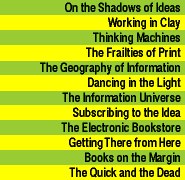


The Frailties of Print
If you publically ask publishers what they do they usually reply with uplifting homilies about disseminating knowledge and protecting intellectual freedom. Privately, though, they say they are booksellers. And by books they mean bound woodpulp products smeared with petroleum residues. That's so because when books are printed on paper there's no essential difference between a physical book and the information in it.That needn't be true for electronic books. The display is one thing; the information displayed is another. We could show many things on one display, or exhibit the same thing on many displays. The display becomes a window onto another world through which we can see whatever we wish to see. A single electronic book could thus be more accurate, flexible, informative, sophisticated, and adaptable than any number of paper books. Because, unlike paper books, electronic books could be connected directly to the world's information sources; they could keep themselves constantly up to date.
Paper books can't talk to libraries and other information sources; so today's authors have to first think up possible questions, research the answers, then find ways to summarize them in print. With electronic books, the reader could pose the questions---questions the author may not even have thought of---the book could research the answers---perhaps almost as well as the author---and let the reader decide how best to display the information. Such books might increase comprehension, retention, and emotional response by combining the best aspects of lectures, television, computers, and print.
Of course, they probably won't. There will still be good books and bad books---perhaps in the same proportion. Electronic books might even be much worse. Because of their great immediacy, they could shape our unconscious responses more deeply. So bad electronic books could be much more dangerous than printed ones, just as a demagogue's speech is more compelling than the text of the speech.
Reading is work, but long before writing we had speech, sounds, and sights. That's why television is so much more popular than books. We've only had about five thousand years to get used to writing, while we've had millions of years in which to hone our audiovisual responses. So we're good at interpreting sounds and sights---particularly if we're in control and can stop, replay, or interact with the action at any time.
We could have interactive books on subjects ranging from foreign languages to painting, from piano playing to architecture, from cooking to hairstyling. Such books could change the way we think, the way we work, and the way we see ourselves, our artifacts, our societies, and our world. With books like those we'd be exploring, not reading.
With such books we need no longer be intimidated by unnecessary formality, nor by the artificial linearity authors are forced to place on a subject just to fit it into the unnatural confines of paper. The difference between those books and paper books could be the difference between behavior and the description of behavior. They needn't simply talk about what could be done; they can show us.